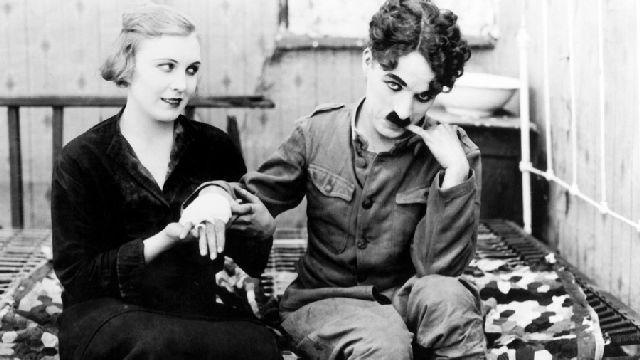Shoulder Arms (1918) 

Director: Charles Chaplin
Cast: Edna Purviance, Charles Chaplin, Syd Chaplin
Synopsis: Charlie is a boot camp private who has a dream of being a hero who goes on a daring mission behind enemy lines.
Although Shoulder Arms proved to be one of Charlie Chaplin’s most popular shorts despite concerns that there would be a backlash against him for making a movie about a war in which he had not fought, it lacks the laughs of other films from the pre-feature stage of his career. According to the Academy of Motion Picture Arts and Sciences, Shoulder Arms, with a running time of 45 minutes, is in fact a feature-length movie, but it has the feel of an extended short which has accidentally strayed into feature-length territory. Either way, Shoulder Arms suggests that Chaplin’s humour was less successful when he was removed from the familiar trappings of his tramp character. Although he of course wears the trademark moustache and has the familiar gait of the tramp, this little soldier could really be anyone.
Shoulder Arms sees a Doughboy enlisted in the army during the Great War. He’s placed in the ‘Awkward Squad,’ and with his difficulty pointing his toes forward he proves to be the most awkward of his company. Nevertheless, the Doughboy finds himself transferred to the front, and also finds that he’s actually quite suited to life on the frontline. Not only does he find that baiting enemy sniper fire serves as a handy way of opening wine bottles and lighting cigarettes, but he even succeeds in taking 13 German soldiers prisoner. His cockiness puts his life in danger, however, when he recklessly volunteers to travel across enemy lines in a suicide mission. Luckily for him, he meets a French peasant girl (the ever-present Edna Purviance — The Immigrant, The Rink) who aids him in his mission.
It’s surprising how realistic the trenches look in Shoulder Arms, as if they were created for a movie which intended to show the grim side of war which remained largely hidden to the public rather than for a comedy. To be fair, Shoulder Arms does touch upon the harsh conditions that soldiers were forced to endure in the trenches, with Chaplin’s character having to sleep in a flooded bunker on one occasion, but overall it understandably steers clear of the deprivations of war, choosing instead to poke fun at the physically incongruous unit of Huns who occupy the neighbouring trench and who fail to spot Chaplin disguised as a tree when he traverses their territory on his mission.
Chaplin’s routines in Shoulder Arms mostly lack the intricate, split-second timing that was a feature of so much of his more successful work. And although there’s a reason for his unusually accomplished performance as a fighting soldier, this uncharacteristic skill gives rise to a cockiness that distances the Doughboy even further from the Little Tramp with which we’re so familiar. Distancing isn’t a problem if Chaplin undergoes a complete departure from his familiar screen persona, but there’s too much of the familiar tramp in his Doughboy character for us to consider him a different person — if, in fact, that was the intention — and so we’re left feeling as if we’re watching a pale, and occasionally lacklustre, imitation.
(Reviewed 31st August 2014)
httpv://www.youtube.com/watch?v=Mf6nYa3C7Xw
